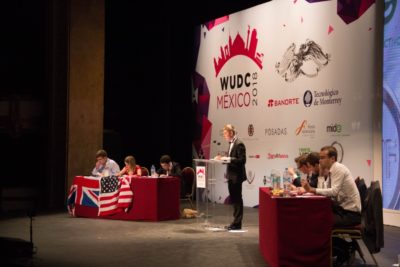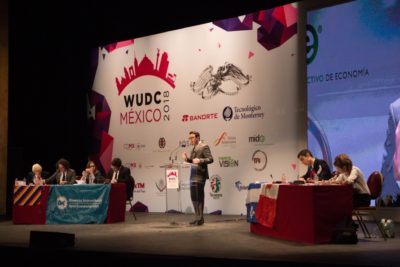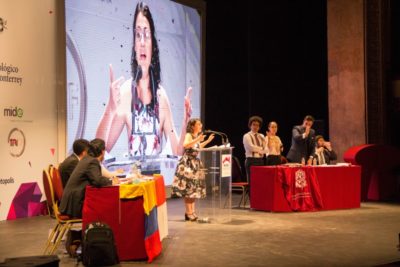Harvard, Oxford and Comillas are the champions for 2018
The World Universities Debating Championship (WUDC) 2018 in Mexico, which took place 28.12.17-04.01.18, are concluded and the champions for the three language categories have emerged. Open Champion is Harvard, ESL-Champion is Oxford and EFL-Champion is Comillas. The finals were hosted in the historical Teatro de la Ciudad Esperanza Iris in the centre of Mexico-City.

The Open Final – © Jacky Hsinghsien Chang Chow
The team Harvard A (Danny DeBois, Archie Hall) won the Open Final as Opening Government on the motion “This house would rather save the life of a single child, over extending the life of 5 adults by 10 years.” The motion came with an info slide as listed at the bottom of this article. Harvard A debated against Princeton A (Sinan Ozbay, Sam Arnesen) in Opening Opposition, Stanford A (Harry Elliott, Bobbi Leet) in Closing Government and USU C (Clyde Welsh, James Pacino) in Closing Opposition. Adjudicating the Open Final was Michael Dunn Goekjian as chair along with Yoni Cohen-Idov, Paul Smith, Wasifa Noshin, Sella Nevo, Tasneem Elias, Samuel Ward-Packard, Yashodhan Nair and Aislin Flynn.

The ESL-Final – © Jacky Hsinghsien Chang Chow
The ESL-Final (English as a Second Language) was won by the team Oxford D (Vikki Perijainen, Ana Vilhelmina Verdnik) in Closing Opposition on the motion “In democratic post-colonial states, this house believes that opposition parties to the party of independence should claim and use the legacy of anti-colonial resistance.” They prevailed against Belgrade A (Miloš Marjanović, Aleksandra Mihajlovic) – who made it to the ESL-Final as an EFL-Team – in Opening Government, Montreal A (Philippe Lemay, Ahmad Nehme) in Opening Opposition and Corriente A (Luis Enrique Zela-Koort, Sebastian Dasso) in Closing Government. The adjudicators for the ESL-Final were Evan Lynyak as chair, Harish Natarajan, James Leeder, Omer Nevo, Steven Penner, Taylor Blackburn, Emma Johnstone, Thomas Simpson and George Clay.

The EFL-Final – © Jacky Hsinghsien Chang Chow
In the EFL-Final Comillas A (Antonio Fabregat, Javier de la Puerta) won as Closing Opposition on the motion “This house believes that it is better for the general population to be more optimistic about the current and future state of the nation (including societal cohesion, peace processes, the state of the economy) than an objectively accurate judgement.” They debated against Binus A (Pandu Noer Umaro, Vici Indrati Milenia) in Opening Government, Rosario A (Hernando José Castro Palma, Juanita Hincapié) in Opening Opposition and Rosario B (Nathalia Isaza Ibarra, Arturo Vallejo Abdala) in Closing Government. The EFL-Final’s jury consisted of Ashish Kumar as chair, who adjudicated with Lucian Tan, Enting Lee, Buzz Klinger, Fanele Washwama, Zoe Seaman-Grant, Alexandra Sundarsingh, Nicholas Ferezin and Brian Wong.
All teams that qualified for the outrounds can be found here. Additionally, the top speakers of each language category got honored. Those were (in total and average per round)
Open Top 10:
1. Dan Lahav (Tel Aviv) 764 | 84,9
2. Ayal Hayut-man (Tel Aviv) 763 | 84,8
3. Teck Wei Tan (Oxford) 746 | 82,9
3. Danny DeBois (Harvard) 746 | 82,9
3. Stephanie White (USU, Sydney) 746 | 82,9
6. Sophie Large (Oxford) 744 | 82,7
6. Rory Flynn (Durham) 744 | 82,7
8. Matt Hazell (Cambridge) 742 | 82,4
8. Bobbi Leet (Stanford) 742 | 82,4
10. Noam Dahan (Tel Aviv) 741 | 82,3
10. Harry Elliott (Stanford) 741 | 82,3
10. Mars He (Harvard) 741 | 82,3
10. Abigail McCarthy (USU, Sydney) | 741 | 82,3
ESL Top 10:
1. Dan Lahav (Tel Aviv) 764 | 84,9
2. Ayal Hayut-man (Tel Aviv) 763 | 84,8
3. Noam Dahan (Tel Aviv) 741 | 82,3
4. Tom Manor (Tel Aviv) 740 | 82,2
5. Sourodip Paul (IBA-DU, Dhaka) 727 | 80,8
6. Sajid Khandaker (IBA-DU, Dhaka) 726 | 80,7
7. Melda Eren (Munich) 721 | 80,1
8. Syarif Fakri (IIUM, Petaling Jaya) 719 | 79,9
9. Philipp Mueller (Munich) 719 | 79,9
10. R. Cara Riantoputra (Indonesia) 718 | 79,8
10. Ahmed Nehme (Montreal) 718 | 79,8
10. Monica Forman (Tel Aviv) 718 | 79,8
EFL Top 10:
1. Sebastian Dasso (Corriente) 707 | 78,6
2. Dhanny Lazuardi Ramadhan (UGM, Yogyakarta) 706 | 78,4
3. Marc-André Schulz (Berlin) 703 | 78,1
3. Simatupang Noel (UGM, Yogyakarta) 703 | 78,1
5. Miloš Marjanović (Belgrade) 702 | 78
6. Dariusch Klett (Vienna) 700 | 77,8
6. Aleksandra Mihajlovic (Belgrade) 700 | 77,8
8. Stefan Torges (Berlin) 699 | 77,7
9. Javier de la Puerta (Comillas, Madrid) 696 | 77,3
10. Antonio Fabregat (Comillas, Madrid) 693 | 77
Motions:
R1: This house would ban all communication tech companies (such as Google, Apple, Facebook, WhatsApp, etc.) from encrypting their users’ data, including the content of their communications, in such a way that the company cannot retrieve that data even under a court order.
R2: This house supports job security legislation.
Info: For the purpose of this debate, “job security legislation” refers to laws intended to make businesses fire employees less often. It’s goal is to disincentivize termination of existing employees, whether the business employs an alternative individual to replace them or not. Examples of this legislation include, but are not limited to, increased severance pay and detailed cause requirement for terminating employment. Protections against discriminatory termination or similar laws do not fall under this.
R3: This house would redefine the criterion for excessive force in the US to be any use of beyond what is reasonable given all the facts of the case, including the benefit of hindsight (e.g. whether the individual had a gun, not whether it was reasonable to believe he had a gun).
Info: The current criterion in the US as to whether a police officer used excessive force is whether he acted reasonably given his perspective at the time and without the benefit of hindsight. Academic research has shown that when using this criterion, juries consistently conclude that officers harming or killing black individuals acted reasonably in almost all circumstances.
R4: This house would limit the amount of time that a museum can display a given piece of art to 3 months out of every 10 year period, rather than allow museums to display their works as long as they choose.
Info: The art that you see in a museum typically comes from one of the following sources: i) that museum’s permament collection that’s always on display; ii) that museum’s permament collection that is mostly kept in storage and may occasionally be displayed (the largest museums usually display as little as 5% of their collections); iii) pieces lent to that museum on a temporary basis by another museum; iv) pieces donated or lent by private individuals or institutions.
R5: This house would allow citizens to vote on individual bills in place of their representative, with the representative retaining the voting power of those of their constituents who did not directly vote on that specific bill.
R6: This house believes that all states should mandate that research on and use of CRISPR technology be exclusively carried out by institutions funded entirely by the state.
Info: CRISPR is currently the only existing technology that allows cheap, fast and targeted gene edition in living organisms. It potentially allows for heritable* changes, though so far very little research on such heritable changes in humans has occurred. * heritable changes are changes that can be passed on from parents to their children.
R7: This house, as Iran, would cease all support for militant groups in the Middle East (e.g. Hezbollah, Hamas, Houthis).
R8: This house prefers a world in which all individuals who have achieved a middle class standard of living choose to pursue the highest level of achievement in their chosen career rather than a world in which those individuals prioritize day-to-day enjoyment over work.
R9: This house would not allow out of court settlements for workplace discrimination and harrasment.
Debate Off: This house regrets the democratisation of news creation and distribution.
Open Partial-Double-Octofinals: This house believes that ASEAN should negotiate all investment deals with Chinese government entities as a block (with decisions made by majority vote of its members), so that no member state can enter into investment deals without the rest of the block.
Info: The Association of South East Asian Nations (ASEAN) is a regional intergovernmental organisation comprising of Southeast Asian states which promotes Pan-Asianism and greater economic integration within the ASEAN common market. There are 10 ASEAN member states, namely Malaysia, Singapore, Myanmar, Thailand, Indonesia, Brunei, the Phillippines, Cambodia, Laos and Vietnam.
ESL-Quarterfinals: This house, as the Chinese Communist Party, would lift all restrictions on foreign investments in China, except restrictions critical to national security.
Info: There are currently a number of restrictions on foreign entities investing in China. Such restrictions include but are not limited to: government approval for large foreign investments in China; limitations on the proportion of certain sectors that can be owned by foreign entities; and foreign companies that enter China are required to do so in a 50% joint venture with a local firm.
Open Octofinals: This house supports the court’s decision to acquit Tehlirian.
Info: Soghomon Tehlirian was an Armenian whose family was killed during the Turkish genocide against Armenians. In Berlin in 1921, Tehlirian assassinated Tallat Pascha, widely considered the main orchestrator of the Armenian genocide. Despite conclusive evidence of his guilt, a Berlin court decided to acquit Tehlirian and free him.
ESL-Semifinals: This house prefers a non-adversarial legal system.
Info: In a non-adversarial legal system, the judge takes responsibility for most of the investigative process – questioning defendants and witnesses, ordering searches to be done – in an attampt to gather facts and look for any and all evidence in an impartial way. The prosecution and defense may be questioned by the judge, but have no control over the proceedings, and perform a minor role within the court.
EFL-Semifinals: This house believes that Catholic religious officials in Mexico should not make statements in support of governmental policies, political parties, or candidates.
Open Quarterfinals: This house, as a parent of a child of ASPD, would enable and support that child given that child’s aims based on their current psychological makeup, instead of trying to make them more empathetic.
Info: Individuals with Anti-Social Personality Disorder (ASPD), formerly known as sociopathy, have a highly reduced ability to feel empathy. People with ASPD do potentially have the ability to feel empathey, and, as with other emotions, their capacity to feel empathy can be increased based on exposure to certain experiences and relationships, yet is unlikely to reach what is considered a “normal” level.
Open Semifinals: This house would create an international court with the ability to classify national debt as “odious debt” at the debtor nation’s request and remove the obligation of that nation to repay
EFL-Final: This house believes that it is better for the general population to be more optimistic about the current and future state of the nation (including societal cohesion, peace processes, the state of the economy) than an objectively accurate judgement.
ESL-Final: In democratic post-colonial states, this house believes that opposition parties to the party of independence should claim and use the legacy of anti-colonial resistance.
Open Final: This House would rather save the live of a single child over extending the life of 5 adults by 10 years.
Info: With a spare $1000, one can provide (on average) a single child, who would otherwise have died in infancy, with a full and healthy life – for example by donating to the distribution of insecticide-treated anti-malaria bed nets.
Alternatively, one can (on average) increase the life expectancy of about 5 adults for 10 years – for example by donating to therapy for deadly acquired diseases in the developing world.
lok.





